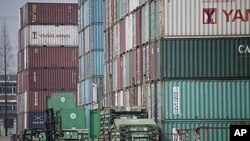Last year, China attained the status as the world's second-largest economy, surpassing Japan. A recent study by researchers in Australia examines China's growing regional economic influence and questions whether Beijing's economic clout will lead to greater political and military influence in Asia.
China has been Australia’s biggest trading partner since 2007, and Chinese purchases of coal, iron and other commodities have provided a key boost to the Australian economy. It has been the same across much of Asia, where Chinese trade has helped boost the economies of such nations as Japan, South Korea and India.
Economic power
But despite these economic ties, it is not clear if Beijing’s economic power will lead to greater regional political and military influence.
John Lee is an analyst at the Lowy Institute, an independent policy group based in Sydney, and author of a recent study on China's regional economic and political relations. He says that because consumer demand in China is relatively small and that access to markets there by foreign companies is restricted, Beijing's neighbors will continue to rely on trade with each other and with Western economic powerhouses, such as the United States and the European Union.
“China is an immensely distrusted power in the region and even as it has become the dominant trade partner for quite a lot of countries in Asia, for example, Japan, South Korea, Australia and even India. Every major capital in Asia has moved closer to Washington in order to hedge against China’s rise," said Lee. " So, effectively [and] strategically you have countries ganging up against China despite China’s economic size and importance as a trading partner to these countries.”
Growing military influence
In its report, the Lowy Institute says many of China's neighbors are also anxious over China's growing military influence, especially regarding maritime disputes in the Yellow and South China Seas.
China has insisted that it is a peaceful partner in Asia and wants to resolve its territorial disputes through dialogue. But its expanding navy and military spending have drawn suspicions.
While the Lowy Institute report sees those suspicions restricting China’s influence, there are other Australian analysts who disagree.
'Continued rise of China'
Andrew Davies is an analyst at the Australian Strategic Policy Institute. He says China’s soaring economic growth and huge military spending could eclipse the United States' influence in Asia.
“The strategic challenge of the next 20 years I think is the continued rise of China and the relative decline of the United States and how that will play out in what we call the global commons," said Davies. "Part of this story, as well as the United States, which is having a look at its own force posturing globally, but particularly in the western Pacific and one of the things that's become clear in the last few years is that U.S. bases in Japan and Guam are vulnerable to increased Chinese ability.”
Analysts at the Lowy Institute say the United States has been successfully re-engaging with Asia is recent years, shoring up existing alliances with Japan and Australia and forging new ties with India and Vietnam.
In June Australia began a review of its defense capabilities that could lead to a new focus on protecting the country's resource-rich northwestern coast. The government said the reassessment was not being conducted to counter China's rising military might, insisting that Canberra was confident Beijing would emerge as a “responsible” player in regional affairs.




